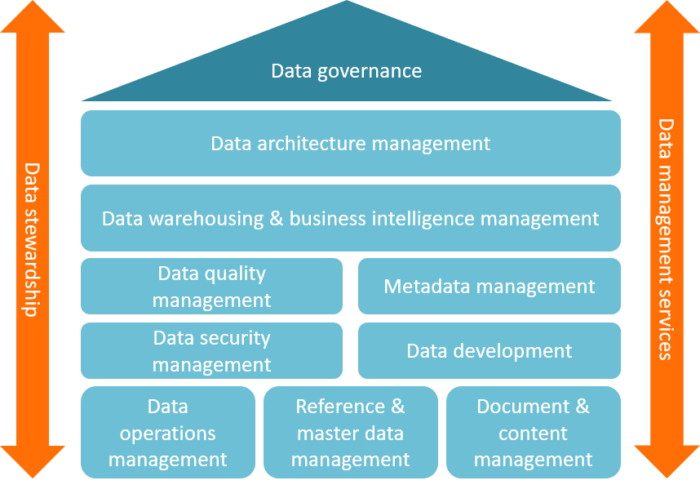By Emmanuel Udeh, Subsurface Data Analyst at Shell.
Lack of clear data ownership is a key challenge for the oil & gas (O&G) industry. Exploration & production (E&P) engineers are usually more focused on their deliverables, and less concerned about data preservation and management. This means that data management issues are constantly falling through the gaps. Implementation of any enterprise data management (DM) strategy needs to incorporate a clear data governance model, with properly defined roles and accountability for managing technical data.
Many O&G organizations have managed to mitigate some of these problems. They have implemented and embedded within their organizational framework processes, standards and principles which describe the governance, roles and responsibilities for the planning and implementation of DM activities. The underlying premise of these guiding principles emphasizes that accurate, secure and quality information and data management processes are key business drivers.
Data governance
For any business, one critical enabler to improve and sustain the quality of its information and data asset is the implementation of a clear and effective data governance model. Data governance is the core component of any strategic DM policy. According to the Data Management Body of Knowledge (DAMA-DMBoK), data governance is the exercise of authority and control (planning, monitoring, and enforcement) over the management of information and data assets. It guides how all other data management functions are performed by defining roles and responsibilities, specifying accountability and responsibility for data quality and data stewardship.

Data governance, along with data stewardship and data quality, provides the foundation for properly managing and sustaining information as a key asset for the E&P industry. Most often, DM programs are initiated to improve the quality and accessibility of business data. However, good data governance is required to sustain any data quality project.
With the current drive towards digitalization, increasingly huge amounts of data are generated and captured on a real-time basis for E&P industry operations. The data needs to be treated as an asset. This implies that there must be a governance structure to support, fund and maintain the asset.
Historically, the E&P industry has always been a leader in the development and application of new technologies. However, even though the industry has had a clear idea for many years of what good data management looks like, technology is still in its infancy with respect to leveraging reliable and consistent data to improve decision-making and ultimately organizational performance. Basing decisions on reliable, well-understood data has become the new frontier for creating competitive advantage. The healthcare, finance, retail, and sports industries have been in the forefront of transforming their decision-making processes with the use of analytics and business intelligence capabilities.
A clear example of this is how the sports industry applies data and analytics to game statistics in order to answer specific questions such as player performance or value, thereby improving overall team performance. Different statistics are captured and analyzed, and the information obtained is harnessed and utilized in increasingly creative ways by teams to stay ahead of their competitors.
Another example is the use of data by online retailers such as Amazon or eBay to make individualized suggestions for their customers. The extensive application of data and analytics on customer profiles and past preferences is used to optimize customer recommendations. This data helps retailers to interact effectively with their customers, improving their experience and satisfaction with attendant positive impact on company revenues.
As the E&P industry increasingly begins to see the value of investing in analytics, it becomes obvious that digitalization holds the potential to transform the entire E&P value chain. However, key challenges towards implementation, such as data quality, storage and management, can only be surmounted by initiating and sustaining an effective data governance program as part of any DM and analytics strategy. Data analytics initiatives need to be well understood and enthusiastically supported throughout the organization, especially by leadership.
Data governance models
A crucial step towards improving organizational data management is the implementation of an effective data governance model. The model should clearly define the data roles and responsibilities of every individual in an organization, and is usually under the guidance of a high-level, executive data steward. Data governance is accomplished most effectively as an on-going program and a continual improvement process, which requires the ownership of management so it is properly aligned with long-term business benefits.
A proper governance model ensures that senior management is involved and represented in whatever decisions are made concerning data. Active participation provides credibility to data management and helps to embed it as a key discipline within the E&P organization.
With most regulated industries seeking to build their businesses on data driven analytics, the role of the Chief Data Officer (CDO) plays a crucial role in helping the organization manage its data as a key corporate asset across the enterprise. The CDO is a senior executive responsible for the enterprise-wide data, information strategy, governance, control, policy development, and effective exploitation. This role combines accountability and responsibility for information protection and privacy, information governance, data quality and data life cycle management, along with the exploitation of data assets to create business value. Unfortunately, according to 2016 research by Consultancy.uk, the oil and gas industry has one of lowest levels of CDO uptake at 2%, only better than the metals and mining industry. This may explain why the E&P industry is struggling to effectively implement and sustain a strategic data-driven culture throughout its respective organizations.
Trusted governance
Apart from impact on revenue, proper implementation of data governance helps organizations ensure that they comply with government regulations, as well as meet internal policies and standards. For example, the European Union’s General Data Protection Regulation (GDPR), which goes into effect on May 25, 2018, requires all EU and UK organizations, including those in the E&P industry, to lawfully process personal data, while respecting individual’s rights. This means that organizations must be able to find, match, and link associated data for an individual. This requirement is especially crucial for the E&P industry because of the international nature of its operations.
Clearly, GDPR compliance can only be achieved if data is managed correctly and effectively such that organizational data is protected and trusted. Developing trust in data can only be achieved by proper data governance, which in turn makes data quality a pressing concern.
Typically, it is common for most E&P companies to have their data stored all over the place; and in some cases around the world. Companies store data in corporate repositories, local network-drives and mixed databases of both raw and interpreted data. Implementing a data governance policy is one way of ensuring enterprise data quality. Storing incorrect data can lead to problems which affect an entire E&P organization, regardless of where data quality issues occur in its operational value chain. A key example is the attendant consequences for issues such as filing inaccurate figures for its reserves; this can include loss of reputation and market value for the affected organization.
Thankfully, a number of E&P organizations have already overcome some of the challenges associated with data governance and analytics. Strong data governance driven by leadership, coupled with comprehensive, timely, and reliable enterprise data sets, is essential to ensuring that the E&P industry reaps the benefits, and succeeds with all data initiatives, in the emerging digital era.










